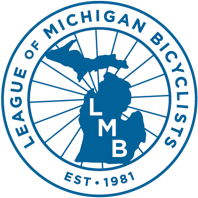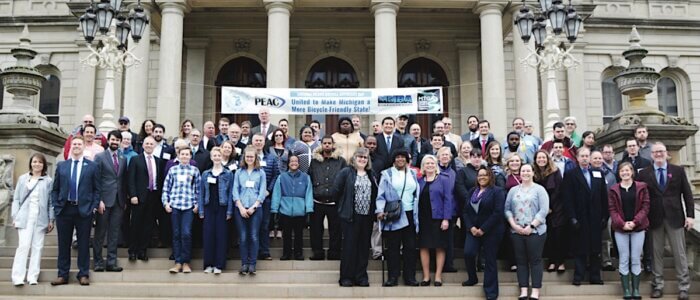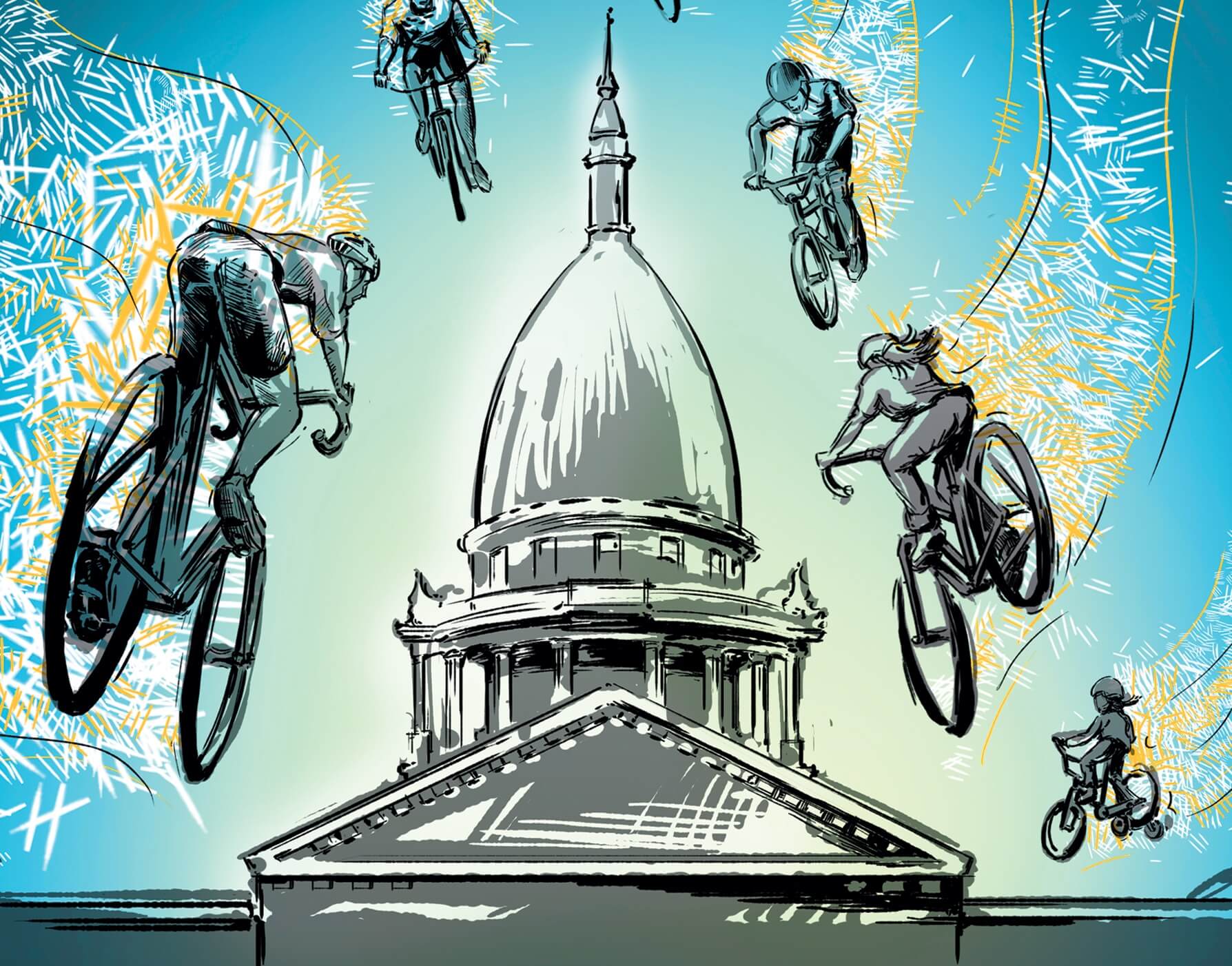 April 7, 2023
April 7, 2023
We’re so pleased to invite you to LMB Advocacy Day, at the Capitol in Lansing on May 2, 2023!
Join us at the State Capitol on May 2 for a unique opportunity for cyclists of all abilities – casual riders and die-hards alike – to converge on the State Capitol and speak with one voice to help make Michigan bicycling better. The most powerful way to reach your representative and senator is to meet with them in person, as a resident of their district, and share what matters most to you. All of us can move the needle when we work together. Your voice is needed in Lansing!
We filled the Capitol steps with bicyclists and lawmaker on May 22, 2019!
The issues
Together, we’ll be asking legislators to support four steps to make Michigan bicycling better — to make our roads safer, to welcome more people into the bicycling community, and to expand the trail systems that can put Michigan in the top tier of mountain bike destinations.

1) Reduce distracted driving.
Phone use results in manual, visual, and cognitive distractions – a motorist using their phone may have hands off the wheel, eyes off the road, and mind off the task. If you are using a phone, you may be sitting behind the wheel, but you are not driving.
Michigan’s current ban on texting while driving does not cover many other distractions from phone use behind the wheel. LMB supports laws that would make it illegal to hold or use a phone while operating a vehicle, except in an emergency, with some allowances for navigation apps and voice-activated, hands-free operation.
In the last legislative session, we got closer than ever before – a hands-free bill package made it through the House and was voted out of committee in the Senate with strong bipartisan support, but wasn’t brought up for a vote in the full Senate. In March, a bipartisan group of lawmakers introduced HB 4250, 4251 and 4252 along with parallel Senate bills SB 239, 240, and 241. A hearing is scheduled for the House Transportation Committee on April 11. We’re hoping the house bills will be voted out of committee on that day and will ask every representative and senator to support them.
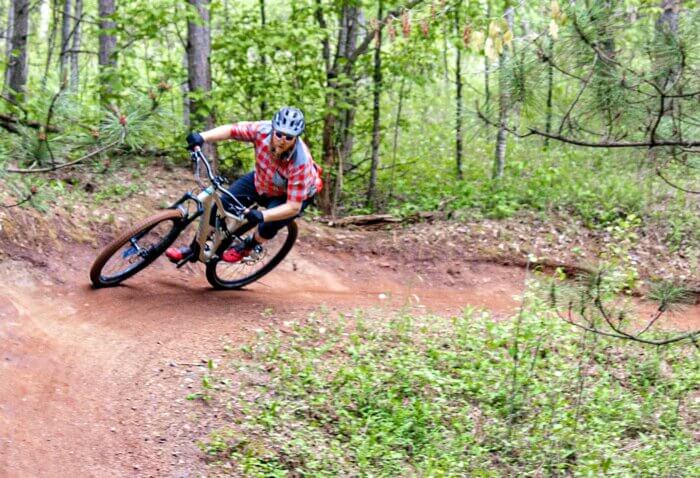
2) Establish dedicated funding for natural surface trails.
In late 2021, the Michigan Department of Natural Resources released the 2022-2032 DNR Trails plan (PDF), with a vision for Michigan to “solidify its national recognition as the Trails State by providing diverse and sustainable trail experiences.”
The plan notes (p. 31): “As Michigan continues to expand the network of state-designated trails, greater emphasis is needed to ensure there is funding to complete the necessary upkeep to continue to provide quality experiences… While motorized trails currently have dedicated funding sources to support operations, no similar structure exists for nonmotorized trails… Most cross-country skiing, hiking, mountain biking and equestrian trails have been developed on state-owned lands with assistance from various state funds. These trails are also often developed and maintained by user groups.”
Michigan needs a sustainable funding source for natural surface trail building and maintenance, as well as one-time funding for specific projects to modernize legacy trail systems throughout the state.
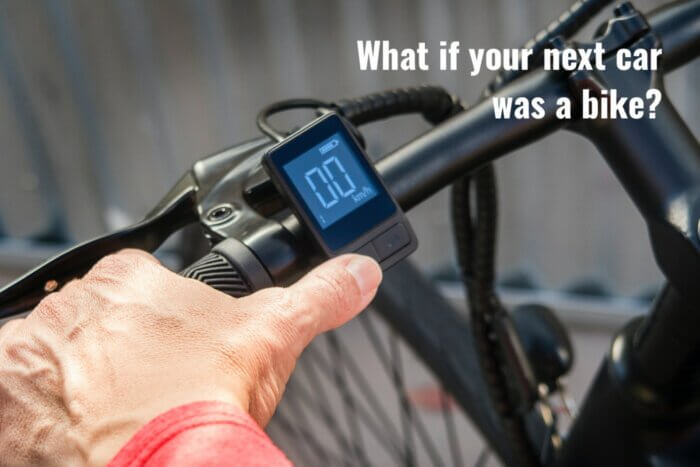
3) Offer e-bike incentives to complement electric vehicle incentives.
LMB advocated successfully in 2017 to clarify the definition of e-bikes in Michigan law. Recent developments in battery technology have dramatically increased the range, power, and usefulness of this vehicle category, and led to a surge in interest and popularity. E-bikes have the potential to open up bicycling for transportation and pleasure to a much broader audience and enable uses – like carrying 100- pound bags of gravel or multiple children – that were formerly exclusive to cars and trucks.
As part of our mission to improve life through bicycling, LMB is now advocating for a statewide pilot program to incentivize e-bike purchases, especially for those who stand to gain the greatest benefits from low-cost transportation, healthy activity, and cleaner air.
E-bikes are affordable and efficient for many transportation needs. They combine the health and air quality benefits of a bicycle with the comfort and convenience of a motor assist for carrying cargo and passengers, while producing less congestion and putting less wear and tear on roads than cars. E-bikes are more expensive than pedal bikes, but much less than EVs.
LMB recommends a pilot program to offer an incentive of $500 for all e-bike purchasers, with an additional $750 for low-income households, as a point-of-sale discount. At least 50% of annual incentive dollars should be reserved for low-income households.
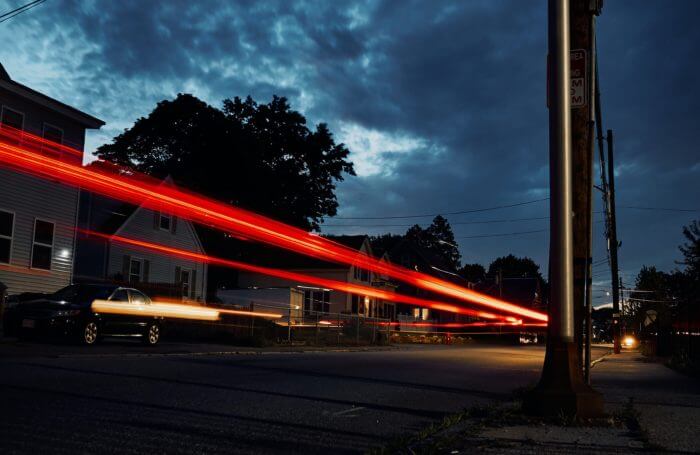
4) Let cities and other municipalities set safer speed limits.
LMB supports HB 4012, sponsored by Rep. Bradley Slagh, which would give local communities more flexibility in setting speed limits “in accordance with traffic engineering practices that provide an objective analysis of the characteristics of the highway” or in response to “a situation with hazards to public safety that are not reflected by the eighty-fifth percentile speed”.
This bill takes important steps to make speed limits safer. It allows officials to take safety hazards into account when setting speed limits, and it’s a good step forward to make our roads safer for people who bike and walk. The previous version of Slagh’s bill passed 94-13 in the House last session before stalling in the Senate.
In 2017, the National Transportation Safety Board published a safety study titled “Reducing Speeding-Related Crashes Involving Passenger Vehicles”. They concluded (in part) that “expert systems such as USLIMITS2 can improve the setting of speed limits by allowing traffic engineers to systematically incorporate crash statistics and other factors in addition to the 85th percentile speed, and to validate their engineering studies” (p. 27) and that “the safe system approach to setting speed limits in urban areas is an improvement over conventional approaches because it considers the vulnerability of all road users” (p. 29.) This bill would allow these national best practices to be adopted in Michigan, and bring us in line with the latest federal safety guidance.
The approach
If you’ve never talked with a legislator before and are feeling a bit nervous at this point about remembering all of the above… don’t sweat it. No experience necessary! We’ll walk you through what to expect and handle the nitty-gritty of setting up meetings.
Once you register, we’ll be in touch with more info about the packet you’ll receive when you arrive and the webinar we’ll offer the week before Advocacy Day to walk through each issue and answer your questions.
The agenda
What should you expect on May 2? We’ll lead an optional ride from Potter Park along the River Trail to the Capitol, gathering at 7:30 a.m. We’ll have plenty of bike parking set up on site, so feel free to ride in on your own or park your car at a nearby meter or public garage.
Here’s the plan for the rest of the day:
- 8:00 am – Check-in, packet pick up
- 8:15 am – Group photo on Capitol steps
- 8:30 am – Welcome, speakers, issue overview & questions
- 9:15 am – 2:00 pm – Meetings with Representatives and Senators
- 12:30 – 1:30 pm – Lunch on Capitol grounds, speakers
- 12:45 pm – LMB Annual Awards
Please let us know ASAP if you’ll be able to join us. Registration is $20 and includes a catered box lunch. If the cost is a barrier for you, please request a scholarship — Advocacy Day is an opportunity for all bicyclists to meet our elected officials.
If you have the means, please consider an additional donation to support the scholarship opportunity. Thanks very much and we look forward to seeing you on May 2!
Sincerely,

John Lindenmayer
Executive Director
League of Michigan Bicyclists
PS. It’s not too late to nominate someone for our Annual Awards, which we’ll be announcing at Advocacy Day – deadline is April 17!
Categorised in: Uncategorized
